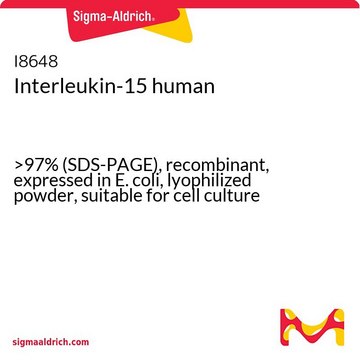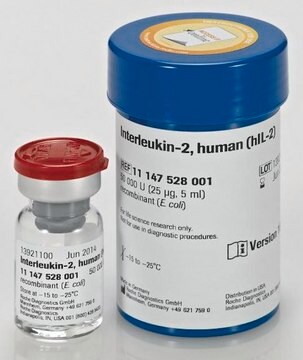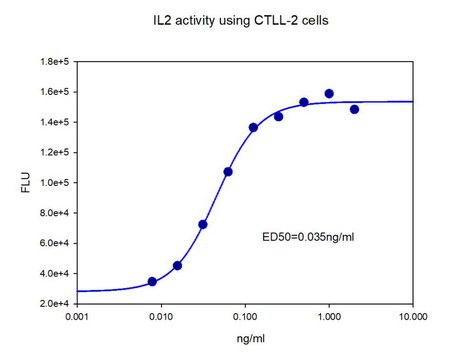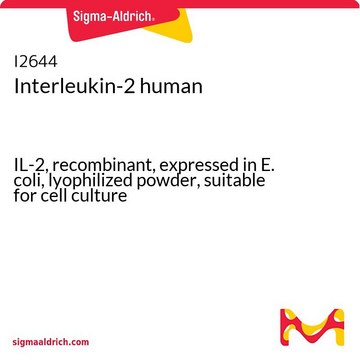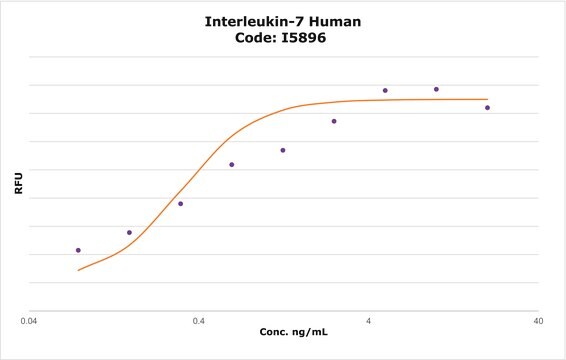SRP3088
IL-21 human
Animal-component free, recombinant, expressed in E. coli, ≥98% (SDS-PAGE), ≥98% (HPLC), suitable for cell culture
Zaloguj sięWyświetlanie cen organizacyjnych i kontraktowych
About This Item
Kod UNSPSC:
12352202
NACRES:
NA.32
Polecane produkty
pochodzenie biologiczne
human
rekombinowane
expressed in E. coli
Próba
≥98% (HPLC)
≥98% (SDS-PAGE)
Postać
lyophilized
masa cząsteczkowa
15.0 kDa
opakowanie
pkg of 10 μg
metody
cell culture | mammalian: suitable
zanieczyszczenia
<0.1 EU/μg endotoxin, tested
kolor
white to off-white
numer dostępu UniProt
Warunki transportu
wet ice
temp. przechowywania
−20°C
informacje o genach
human ... IL21(59067)
Opis ogólny
IL-21 is a pleiotropic cytokine produced by CD4+ T cells in response to antigenic stimulation. Its action generally enhances antigen-specific responses of immune cells. The biological effects of IL-21 include induction of differentiation of T-cells-stimulated B-cells into plasma cells and memory B-cells, stimulation (in conjunction) with IL-4 of IgG production, and induction of apoptotic effects in naïve B-cells and stimulated B-cells in the absence of T-cell signaling. Additionally, IL-21 promotes the anti-tumor activity of CD8+ T-cells and NK cells. IL-21 exerts its effect through binding to a specific type I cytokine receptor, IL-21R, which also contains the gamma chain (gc) found in other cytokine receptors including IL-2, IL-4, IL-7, IL-9 and IL-15. The IL-21/IL-21R interaction triggers a cascade of events which includes activation of the tyrosine kinases JAK1 and JAK3, followed by activation of the transcription factors STAT1 and STAT3. Recombinant human IL-21 is a 15.0 kDa protein consisting of 132 amino acid residues.
Działania biochem./fizjol.
IL-21 is a pleiotropic cytokine produced by CD4+ T cells in response to antigenic stimulation. Recombinant human IL-21 is a 15.0 kDa protein consisting of 132 amino acid residues.
Sekwencja
MQDRHMIRMR QLIDIVDQLK NYVNDLVPEF LPAPEDVETN CEWSAFSCFQ KAQLKSANTG NNERIINVSI KKLKRKPPST NAGRRQKHRL TCPSCDSYEK KPPKEFLERF KSLLQKMIHQ HLSSRTHGSE DS
Postać fizyczna
Lyophilized from 10 mM Sodium Phosphate, pH 7.6.
Rekonstytucja
Centrifuge the vial prior to opening. Reconstitute in water to a concentration of 0.1-1.0 mg/ml. Do not vortex. This solution can be stored at 2-8°C for up to 1 week. For extended storage, it is recommended to further dilute in a buffer containing a stabilizer (example 5% Trehalose) and store in working aliquots at -20°C to -80°C.
This page may contain text that has been machine translated.
Kod klasy składowania
11 - Combustible Solids
Klasa zagrożenia wodnego (WGK)
WGK 3
Temperatura zapłonu (°F)
Not applicable
Temperatura zapłonu (°C)
Not applicable
Certyfikaty analizy (CoA)
Poszukaj Certyfikaty analizy (CoA), wpisując numer partii/serii produktów. Numery serii i partii można znaleźć na etykiecie produktu po słowach „seria” lub „partia”.
Masz już ten produkt?
Dokumenty związane z niedawno zakupionymi produktami zostały zamieszczone w Bibliotece dokumentów.
Julia Parrish-Novak et al.
Journal of leukocyte biology, 72(5), 856-863 (2002-11-14)
Interleukin (IL)-21 was recently discovered using a functional cloning approach based on expression of its receptor. It is similar in domain organization and primary sequence to IL-2 and IL-15. Like these cytokines, IL-21 uses the common gamma chain of the
Iskra Tuero et al.
PLoS pathogens, 11(8), e1005101-e1005101 (2015-08-13)
Many viral infections, including HIV, exhibit sex-based pathogenic differences. However, few studies have examined vaccine-related sex differences. We compared immunogenicity and protective efficacy of monomeric SIV gp120 with oligomeric SIV gp140 in a pre-clinical rhesus macaque study and explored a
Melinda Mata et al.
Journal of immunotherapy (Hagerstown, Md. : 1997), 37(8), 407-415 (2014-09-10)
Adoptive transfer of T cells expressing chimeric antigen receptors (CARs) has shown promising antitumor activity in early phase clinical studies, especially for hematological malignancies. However, most preclinical models do not reliably mimic human disease. We reasoned that developing an adoptive
Adèle de Masson et al.
Blood, 125(11), 1830-1839 (2015-01-22)
Interleukin 10 (IL-10)-producing B cells (regulatory B cells [Bregs]) regulate autoimmunity in mice and humans, and a regulatory role of IL-10-producing plasma cells has been described in mice. Dysfunction of B cells that maintain homeostasis may play a role in
Elisabeth Salzer et al.
The Journal of allergy and clinical immunology, 133(6), 1651-1659 (2014-04-22)
Alterations of immune homeostasis in the gut can result in development of inflammatory bowel disease (IBD). Recently, Mendelian forms of IBD have been discovered, as exemplified by deficiency of IL-10 or its receptor subunits. In addition, other types of primary
Nasz zespół naukowców ma doświadczenie we wszystkich obszarach badań, w tym w naukach przyrodniczych, materiałoznawstwie, syntezie chemicznej, chromatografii, analityce i wielu innych dziedzinach.
Skontaktuj się z zespołem ds. pomocy technicznej

